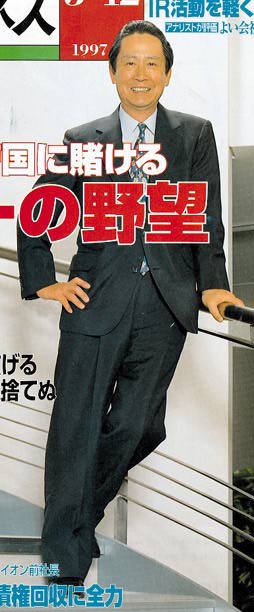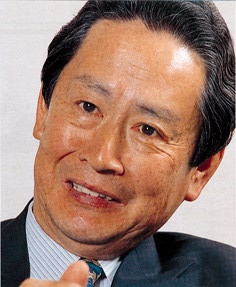
 |
| Sony President Idei |
|---|
Sony achieves strong success in their
50th year
Sony's philosophy seems to be that they should strive to ``Make
products that they'd like to have themselves''. And this concept they
attribute to having created new markets for them. The leader of Sony
during this era has been Sony President Nobuyuki Idei, who
considers himself in charge of product quality.
Their 50th anniversary was in 1996, and although this certainly helped unite the employees, this alone cannot explain why Sony did so well during that period.
Sony has introduced many products that sell out very quickly after going on sale. Sony has been successful in each product field, establishing market shares that put them well ahead of the competition.
President Idei: ``It's said that I put effort into broadcasting and movies, but our focus has really been hardware (imaging and acoustics devices),'' Though there have been benefits from Mr. Idei's approach, they are not the fruits of new business methods, but due rather to the fact that Sony has returned to its roots, and has reaffirmed its pursuit of ``Sonyness.''
The production of the portable MiniDisc player, the ``MD Walkman MZ-E50,'' that was put on sale last October, has even now not been able to keep up with sales, and at the end of last year the unit was so popular that stores had to sell even their display samples. From its development process we can get a good sense of the Sony company's strong individuality.
A main feature of the product is that it is small and light. Sony's advertising slogan, ``The smallest and lightest in the world,'' is quite believable when you hold it in your hand. It easily slips into a dress shirt pocket without any sense of intrusion. Compared to previous models, it is about half the weight and size.
``Sony's share of portable MiniDisc players, which was under 50%, went up to 60% with this hit,'' said Mr. Shizuo Takashino, a president of Sony Personal AV Company.
 |
| Director Fukushima |
|---|
If you think he is exaggerating just for outsiders, you would be making a big mistake. He said the same thing in front of people in the sales department of Sony at their meeting last November.
``You don't have to sell this. Don't start working on sales promotions and stuff like that,'' he asserted. In front of the stunned sales people he went on ``This is a product I really put myself into. This is not something I want women and children to be carrying around. I don't want to sell it to foreigners if they do not understand its worth. If people really want one, they should be prepared to stand in line to buy it.''
Some foreign managers of overseas sales firms and women business department personnel were in the meeting. The sound of such bigotry interrupted the meeting for a moment, and people looked at him with distrustful eyes. Calm returned, however, as they understood that he was not really expressing bigotry against women and foreigners, rather, he was trying to emphasize how much of himself he had put into this product. However, one of the female salespeople said repeatedly ``I'm definitely buying one of these. Definitely.''
Middle-aged businessmen can freely listen to their favorite music or study English whenever and wherever they want. Mr. Fukushima was afraid that his dream for the product would be compromised if it started to become popular with women and children. Also, the market for MiniDisc players outside of Japan has not been sufficiently established, and he did not want a situation where the product sat in the shops gathering dust.
Because his first aim was to realize a dream, no projected sales price was set at the start of the unit's design. The goal of the project was to make a smaller and lighter MiniDisc player, cost was a secondary consideration.
A magnesium alloy was adopted for the unit's case and a titanium sheet for the part where the disc is inserted. This was more expensive in both material and processing cost than before, but the material is lighter and harder.
The greatest difficulty was to make a lighter pick-up unit (the part that reads the reflected light signal from the disk). Mr. Fukushima estimated that they would be able to make a dramatic weight reduction from the usual 23g to 3.5g if they re-examined the fundamentals of the pick-up's design and materials.
However, the component company which makes parts within Sony flatly rejected him, saying ``We can't make such parts,'' because they were too small to ride on an automated assembly line. Unthwarted, Mr. Fukushima next brought his story to Sony Bonson (in Sakado, Saitama), makers of the Walkman.
At its peak, Sony Bonson made 8.1 million Walkman per year, but that number fell to half after Sony started moving its manufacturing abroad. Though conscious of their state of crisis, Bonson's business director Kazuhiro Ueda indicated confidently ``Our company has always striven to manufacture leading edge products.'' If they refused however, their raison d'etre would be in question.
But it was the first time for them to make a pick-up unit, besides which, the pick-up was to be one seventh the size of conventional units. Director Ueda said he had some sleepless nights worrying about how to make it, but after trial and error they eventually managed to manufacture the unit.
The overtime work in Sony Bonson's Sakato factory has not kept any machines busy however. Female workers sit near each other using tweezers to assemble parts as small as a grain of rice, each pick-up being made entirely by hand.
The developer's intense desire for a product he wanted to make (while nearly considering consumers to be irrelevant), as well as the tenacity of the technical engineers in the factory who met the stringent demands and pulled off its manufacture, opened a new market.
But, it is also a fact that facets of such Sonyness are fading as the company grows larger.
 |
| President Idei |
|---|
President Idei let out that even though his company is in top shape, ``It is our task to find out how to keep from increasing indirect staff.'' By ``indirect staff'' he does not mean those who are commonly called office staff, rather, people within the company who constantly criticize others.
It has been said that even among Sony employees, there are actually those who hold engineers back, such as by telling one with a unique idea that ``Our chairman and president's opinions seem different from yours.'' In such cases, Mr. Fukushima telephones the chairman or president directly to check out the situation. ``I feel disgusted with a person who tries to force others down using authority,'' Mr. Fukushima said.
One reason President Idei makes sweeping changes to the
organization every year is to increase the number of
members willing to pursue their dreams.
The article then goes on to discuss Sony's efforts to create the ``Super Flat Trinitron.''
They conclude with this paragraph:
President Idei called himself CQO (Chief Quality Officer) as soon as he took the president's post, and has taken a top down approach to carrying out improvements in management quality that includes not only a concern for product quality but also such things as revitalizing the organization. Sony's big hit in its 50th year was supported by a strong top leadership that believed Sony's primary business was, indeed, imaging and acoustics devices.